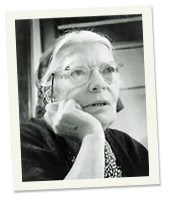History
The Catholic Worker Movement | Dorothy Day
Dorothy Day's spirituality is marked by these characteristics:
- Love of Scripture: Throughout her life, Dorothy received comfort and inspiration from the Bible, especially the Psalms, the Pauline writings, and the Gospels. They were part of her daily meditation, and scripture verses and images spontaneously wove themselves into her writings. The example and teachings of Christ were at the heart of her spirituality.
- Solidarity with the Poor: In the Catholic Worker community, Dorothy shared her daily energies with and on behalf of poor people. Her writings, direct practice of the works of mercy, and her own voluntary poverty bound her to poor, homeless, sick, and desperate people.
- Personalism: Dorothy loved doing works of mercy because they allowed her to take direct and immediate action for her brothers
and sisters in Christ and against the ills of society that robbed them of their life, freedom, and dignity. Her engagement with other
people flowed from her wholeness as a person; her heart and mind were cultivated through her reading, reflection, conversations, writing, and worship. She wanted the fullness of life for herself
and every person. - Prophetic Witness: By her public words and work, Dorothy sought to imitate Christ's witness against injustice, even when such witness seemed folly. Like Christ, she was critical of the powers and structures of injustice and endured ridicule and opposition for
her witness. - Peacemaking: A steadfast pacifist, Dorothy opposed all wars and the use of force and violence to solve human problems. She practiced and promoted human dignity with the spiritual weapons of prayer, fasting, almsgiving, civil disobedience, and works of amendment. Like Jesus, the woman at the well, and Saint Paul, she took her message to the people in the streets.
- A Sacramental Sense: Dorothy looked to sacramental celebrations, especially the Eucharist, for daily spiritual sustenance, and she saw the world, its people and all of nature, to be full of God's grandeur and love as well.
- Gratitude: In good times and in bad, Dorothy had a keen sense of appreciation and learned to trust in the providence of God. Dorothy regularly expressed gratitude not only to God but also to those around her and to The Catholic Worker's readers.
Four Ways to be like Dorothy Day
- Invite the poor, lame, the despised, and disenfranchised to your home and table.
- Sell all you have and give to the poor. Embrace poverty.
- Speak out for justice and peace. Do not be afraid to stand firm on your principles.
- Rely on divine providence. Experience God's love in community. Pray constantly.
If these are too hard, start here...
- Find a place where you can serve and share meals with the poor, lame, despised and disenfranchised. Get to know people by name. Visit on a regular basis.
- Sell what you can and give to the poor. Embrace a simpler life. Simplify often.
- Speak out on one issue that is important to you. Take concrete action and be persistent. Ground your opinion in your religious principles and a well-formed conscience. Witness to the need for principled action.
- Sustain yourself through liturgy, prayer, and community life.
- Work at a soup kitchen.
- Donate used items to St. Vincent de Paul or other charity.
- Talk to a friend about an issue that is important to you.
- Participate in liturgy and church activities.


We were just sitting there talking when lines of people began to form, saying "We need bread." We could not say, "Go, be thou filled." If there were six small loaves and a few fishes, we had to divide them. There was always bread.
We were just sitting there talking and people moved in on us. Let those who can take it, take it. Some moved out and that made room for more. And somehow the walls expanded.
It was as casual as all that, I often think. It just came about, it just happened.
I found myself, a barren woman, the joyful mother of children. It is not always easy to be joyful, to keep in mind the duty of delight.
The most significant thing about the Catholic Worker is poverty, some say.
The most significant thing is community, others say. We are not alone anymore.
But the final word is love. At times it has been, in the words of Father Zossima, a harsh and dreadful thing, and our very faith in love has been tried through fire.
We cannot love God unless we love each other, and to love we must know each other. We know Him in the breaking of bread and we know each other in the breaking of bread, and we are not alone anymore. Heaven is a banquet and life is a banquet, too, even with a crust, where there is companionship.
We have all known the long loneliness and we have learned that the only solution is love and that love comes with community.
It all happened while we were sitting there talking, and it is still going on.
-Dorothy Day





